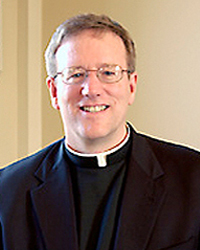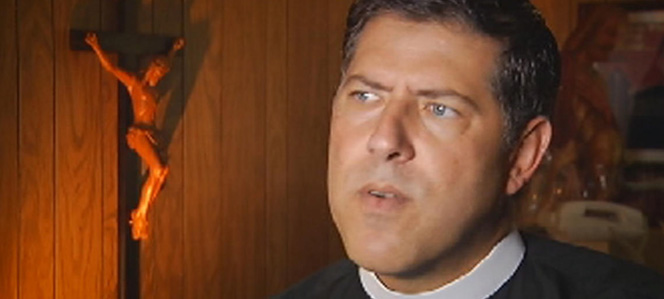By Rev. Robert Barron
 A few weeks ago, in the wake of the Fr. Alberto Cutie scandal, an editor at CNN.com asked me to write a short piece (800 words) on the meaning of celibacy from a Catholic standpoint. So I composed what I thought was a harmless little essay, laying out as simply and straightforwardly as I could why the Church reverences celibacy as a spiritual path. I purposely avoided a number of the hot button issues surrounding the matter, and I pointedly insisted that any explanation of celibacy that involves a denigration of sex and marriage is inadmissible. Well, I sent this article off to CNN, rather proud that it would appear in such a prominent venue.
A few weeks ago, in the wake of the Fr. Alberto Cutie scandal, an editor at CNN.com asked me to write a short piece (800 words) on the meaning of celibacy from a Catholic standpoint. So I composed what I thought was a harmless little essay, laying out as simply and straightforwardly as I could why the Church reverences celibacy as a spiritual path. I purposely avoided a number of the hot button issues surrounding the matter, and I pointedly insisted that any explanation of celibacy that involves a denigration of sex and marriage is inadmissible. Well, I sent this article off to CNN, rather proud that it would appear in such a prominent venue.
Then they started coming, first on my own e-mail: critiques, as vociferous as any I’ve ever received. A little taken aback, I went to the CNN.com site and found the article posted on the main page—and followed by nearly a hundred comments, 98 of which were sharply negative. About a week later, the article was picked up on Anderson Cooper’s blog site and once again, it was accompanied by unanimously disapproving commentary from readers. It appears as though this matter of celibacy strikes a nerve! And thereupon, I think, hangs a tale.
What were the criticisms, you ask? Well, they came from two basic camps, the evangelical Protestants and the radical secularists. Over and over, Protestant critics informed me that celibacy had no biblical foundation, and several of them pointed to a passage from the fourth chapter of 1st Timothy to the effect that “deceitful spirits” will one day invade the church of Jesus and “forbid marriage.” Well, the last time I checked, St. Paul, a celibate, told his people that, though he wouldn’t impose celibacy on them, he would prefer that they remain as he is (1 Cor. 7:7), and Jesus, a celibate, told his disciples that some people “make themselves eunuchs for the sake of the kingdom,” that is, they eschew marriage, and that he would urge those who are able to embrace this sort of life to do so (Matt. 19:12). I don’t know, but that seems like pretty good Scriptural support to me! As for first Timothy, the Catholic Church forbids marriage to no one. In fact, throughout its history, the church has condemned as heretical those movements—Gnosticism, Manichaeism, Catharism—which did look upon marriage and sex as aberrational. No one in the church forbade me to marry; rather, I chose not to marry in order to pursue another path of love.
From the secularist side, I heard ad nauseam the claim that, in defending priestly celibacy, I was out of touch, otherworldly, didn’t have my feet on the ground, etc., etc. Well, yes. At the heart of my argument was the assertion that celibacy is a living witness to a supernatural way of love, to the manner in which the saints live in heaven. When he was challenged by the Saducees, who did not believe in the resurrection, Jesus said, “those who are deemed worthy to attain to the coming age and to the resurrection of the dead neither marry nor are given in marriage. They can no longer die, for they are like angels” (Lk. 20: 34-36). The Catholic church recognizes that even now certain people should live as eschatological signs of this world to come, as embodied witnesses to a transcendent kind of love. It struck me that the vehemence of the critiques I received on this score flowed from the extreme challenge that celibacy offers precisely to the secularist view of the world. Another standard charge from the secularist camp was that the practice of celibacy has led and continues to lead to the sexual perversion of priests and the abuse of children. It frankly amazes me how persistent is this delusion. Though it’s been said thousands of times already, it evidently bears repeating: the overwhelming majority of sexual abusers of children are not priests and are not celibates. To say that celibacy is the cause of sexual abuse is about as reasonable and statistically defensible as to say that marriage is the cause of sexual abuse. Please don’t get me wrong: the sexual misconduct of way too many priests is a serious problem indeed, and one that the church has to address at many levels. But it’s a mistake to correlate it to simple-mindedly to celibacy.
A criticism common to both the evangelicals and the secularists is that celibacy was a cynical invention of medieval Catholic bishops and Popes eager to consolidate their hold on church property. If priests were married, you see, their wives and children would inherit the wealth that would otherwise have gone into the coffers of the church. I don’t doubt for a moment that there might have been some hierarchs who thought along those lines, but to reduce the discipline of celibacy to such commercial considerations betrays a pathetic grasp of the spiritual history of the human race. Celibacy has been embraced by religious people trans-historically and trans-culturally. Certain Hindus, Buddhists, Sufi Muslims, and Jewish Essenes have, over the centuries, abstained from marriage for spiritual reasons, convinced that it ordered them to God in a unique way. Why can’t the same be said of Catholic priests?
I mentioned above that the very venom of the reactions to my article is telling. In a certain sense, celibacy is meant to annoy, puzzle and unnerve us, for it witnesses to a dimension of existence that we can’t directly see, that remains alien to our experience and our ordinary categories of thought. Celibacy make a lot of people sputter and scratch their heads. Good.
